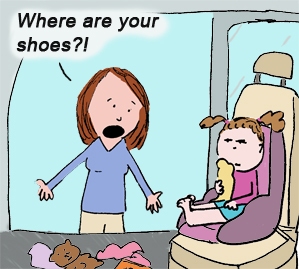 Your baby starts communicating with you before they take their first breath. It’s true, little Johnny and Susie are communicating even before they leave the womb. Sure, early communication seems like a lot of crying and grunting at first, but quickly becomes so much more! As you understand early communication, you will be better equipped to enhance your baby’s language from infancy through adulthood. (continue reading at https://eloquentspeech.blogspot.com/)
Your baby starts communicating with you before they take their first breath. It’s true, little Johnny and Susie are communicating even before they leave the womb. Sure, early communication seems like a lot of crying and grunting at first, but quickly becomes so much more! As you understand early communication, you will be better equipped to enhance your baby’s language from infancy through adulthood. (continue reading at https://eloquentspeech.blogspot.com/)
Uncategorized
“Tongue Tied”
You have probably heard of someone being “tongue tied”. A condition where the tongue is literally “tied down” on the floor of the mouth. Read more about this condition and view the answers to most questions about “tongue tie”…
https://eloquentspeech.blogspot.com/2013/11/tongue-tied.html
What is Stuttering?
Should I be worried if my three year old starts stuttering?
Should I finish their sentences?
Should I get my child evaluated for a fluency (stuttering) disorder?
Read more https://eloquentspeech.blogspot.com/
Does Your Child Feel Too Much?
Children with Sensory Processing Disorder feel, see, hear, taste, and smell much more than you and I. Read more about Sensory Processing Disorder here:
School Teachers are the Highest-Risk Occupation for Voice Disorders
Studies have demonstrated that, of all professions, school teachers place the most strain on their voice resulting in the highest number of voice related disorders. School teachers tend to speak loudly for long periods of time without adequate rest. Along with lack of rest, they are also more at risk for respiratory illnesses due to exposure to infections, mold, dust, and other environmental pollutants. 11 percent of teachers report current voice disorders and 58 percent have reported a history of a voice disorder. These disorders are the cause of teacher absences and/or inability to perform all necessary daily activities. Vocal hygiene exercises, including sufficient water intake, use of amplification systems, and resting, are a good start in preserving the voice. Although, sometimes more intense recovery methods must be employed including both behavioral changes (using the voice and respiratory system together more efficiently) as well as continual voice education and monitoring. (The ASHA Leader, March 2013, p.37-40).
Make running errands more fun for everyone!
Article, life_easier_errands and tipcard, from the series “Making Life Easier” by Pamelazita Buschbacher, Ed.D. includes lots of helpful reminders to get in and out of the house a bit more comfortably with children.

Here are some of her bullet points…
- Use a transition warning (e.g., verbal, timer,count down, sing a song).
- Tell your child where you will be going.
- Use “First…, Then…” statements.
- Use a Travel Book.
- Include one of your child’s favorite places.
- Provide a transition object (toy, blankie, book, travel book, etc.).
- Provide 2 or 3 choices for the transition object.
- Prepare a cooler.
- Prepare your diaper bag or a backpack (written list in bag).
- Getting in the Car Seat:
- Make getting to the car a game (sing, skip, hop, race, count to 10).
- Make buckling up in his car a game (sing, encourage child’s your child’s help).
- Show a picture of him safely buckled in his seat. Keep it in his travel book.
- Insist that everybody has their seatbelts on before the car moves.
- Provide your child choices.Your child could choose music, toys, books, etc.
- Make your car a “child friendly” place.
- Keep an activity bin in the car. Rotate the contents every now and then. Allow your child to choose some of the contents.
- Play children’s music CDs. Provide 2 or 3 choices. Sing together.
- Cool or heat car in advance. Provide a means for your child to communicate how he feels.

